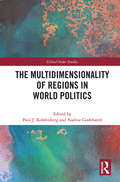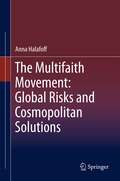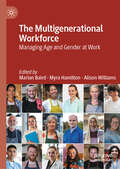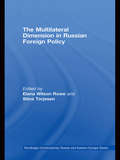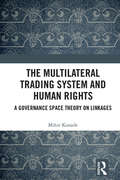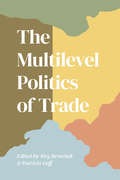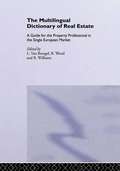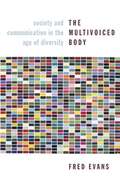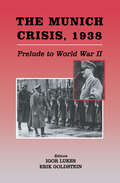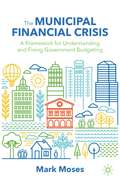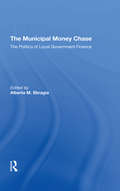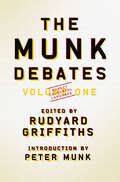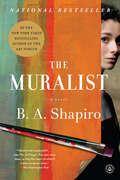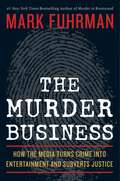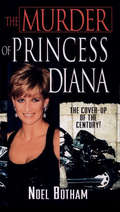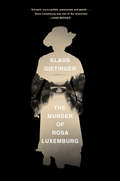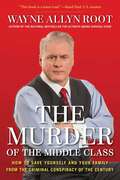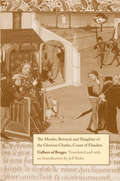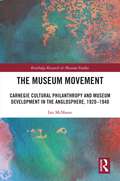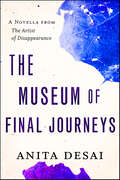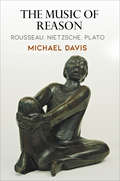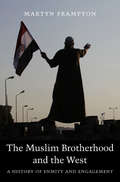- Table View
- List View
The Multidimensionality of Regions in World Politics (Global Order Studies)
by Nadine Godehardt Paul J. KohlenbergThis book examines what counts regarding the role and conceptualization of regions in world politics. It presents a fresh look at which narratives awake, persist, fall dormant or re-emerge amidst diverse interlocking processes of environmental, technological and global political changes. It puts forward a thorough and multidimensional conceptualization of regions as embedded in changing, overlapping environments, and requires more attention to regions’ shifting materiality, temporality and technological underpinnings. Combing the approaches, questions and analyses of Critical IR and Political Geography, it calls for a renewed emphasis on the puzzle of how the contextual environment of regions may become more (or less) multidimensional, or how some aspects of a region’s contextual environment may be mutually constitutive in non-intuitive ways. Ultimately, it sheds light on the politics of regions and the regional scale in international politics in order to overcome the often-underlying territorial fixity of territory and space within IR approaches. This book will be of key interest to scholars and students of international relations, international political sociology, political geography, regionalism, geopolitics and area studies.
The Multifaith Movement: Global Risks and Cosmopolitan Solutions
by Anna HalafoffThis book documents the ultramodern rise of the multifaith movement, as mulitfaith initiatives have been increasingly deployed as cosmopolitan solutions to counter global risks such as terrorism and climate change at the turn of the 21st century. These projects aim to enhance common security, particularly in Western societies following the events of September 11, 2001 and the July 2005 London bombings, where multifaith engagement has been promoted as a strategy to counter violent extremism. The author draws on interviews with 56 leading figures in the field of multifaith relations, including Paul Knitter, Eboo Patel, Marcus Braybrooke, Katherine Marshall, John Voll and Krista Tippett. Identifying the principle aims of the multifaith movement, the analysis explores the benefits--and challenges--of multifaith engagement, as well as the effectiveness of multifaith initiatives in countering the process of radicalization. Building on notions of cosmopolitanism, the work proposes a new theoretical framework termed 'Netpeace', which recognizes the interconnectedness of global problems and their solutions. In doing so, it acknowledges the capacity of multi-actor peacebuilding networks, including religious and state actors, to address the pressing dilemmas of our times. The primary intention of the book is to assist in the formation of new models of activism and governance, founded on a 'politics of understanding' modeled by the multifaith movement.
The Multigenerational Workforce: Managing Age and Gender at Work
by Myra Hamilton Alison Williams Marian BairdThis book provides original and groundbreaking insights into the development and outcomes of multigenerational workforce strategies in Australian workplaces through the combined lens of age, gender and caring. Based on a large-scale study and real-world case studies with six Australian organisations, it highlights leading policies and practices that promote successful ageing at work, identifies optimal work designs for older workers’ participation, engagement and wellbeing at work, and offers strategies to support workers to combine work and unpaid care at different times in their lives. The book offers essential guidance for those undertaking research on multigenerational workforces, and for managers, human resource staff, diversity and inclusion staff, and other practitioners in organisations seeking to deepen their understanding of age- and gender-inclusive workforce policies and practices in the context of ageing populations and workforces.
The Multilateral Dimension in Russian Foreign Policy (Routledge Contemporary Russia and Eastern Europe Series)
by Elana Wilson Rowe Stina TorjesenThis book examines the place of multilateralism in Russia’s foreign policy and Russia’s engagement with multilateral institutions. Throughout the post-Soviet period, both Yeltsin and Putin consistently professed a deep attachment to the principles of multilateralism. However, multilateralism as a value, concept, strategy or general phenomenon in Russian foreign policy has hitherto been neglected by scholars, seldom assessed in its own right or from a comparative perspective. This book fills that gap, combining wider conceptual perspectives on the place of multilateralism in Russian foreign policy thought and action with detailed empirical case studies of Russian engagement at the global, transatlantic and European levels, and also in Russia’s regional environment. It examines Russia’s role and relationship with the UN, NATO, G8, EU, OSCE, Arctic Council, Eurasian Economic Community, Commonwealth of Independent States, Shanghai Cooperation Organization and Collective Security Treaty Organization, covering a wide range of issue areas including nuclear non-proliferation and trade. Throughout, it considers the political, economic and security interests that shape Russia’ foreign relations, conception of multilateralism and activity in multilateral settings. Overall, this book is an important resource for anyone interested in Russian foreign policy and its role in international relations more generally.
The Multilateral Trading System and Human Rights: A Governance Space Theory on Linkages
by Mihir KanadeThis book contributes an original theory to understanding human rights and international trade. It offers the ‘governance space’ framework for analysing the linkages and normative relationships between the multilateral trading system (MTS) and human rights regimes. Drawing upon key case studies, the author identifies connecting strands as also gaps in linkage issues. He further examines the ‘right to development’ approach to resolve tensions between these two regimes and demonstrates how the approach may be the most appropriate road map to finding sustainable solutions in balancing human rights and equitable free trade in a complex globalised world. Presenting new legal analyses informed by current debates drawn from international organisations – the World Trade Organization, United Nations, International Labour Organization – governments, civil society and academia as well as global commitments such as the Sustainable Development Goals, the book proposes a systematic and holistic policy intervention. This timely and transdisciplinary text will be of great interest to academics, students and scholars of human rights, international trade, international law, development studies, public policy and governance, economics, politics and international relations. It will also be useful to policymakers, think-tanks, human rights advocates, professionals, lawyers, civil society organisations, non-governmental organisations and trade experts.
The Multilevel Politics of Trade (Studies in Comparative Political Economy and Public Policy)
The Multilevel Politics of Trade presents a timely comparative analysis of eight federations (plus the European Union) to explore why some sub-federal actors have become more active in trade politics in recent years. As the contributing authors find, there is considerable variation in the intensity and modes of sub-federal participation. This they attribute to three key factors: the distinctive institutional features of federal systems; the nature and scope of trade policy and trade agreements; and the extent of social mobilization that accompanies a particular trade policy conversation. As a whole, The Multilevel Politics of Trade argues that sub-federal actors’ interests (jurisdictional, political, and economic) are what motivate them to participate in trade debates. However, institutional configurations, coupled with the influence of civil society actors, political parties, and others determine the nature and scope of that participation. Informed by a deep knowledge of federal dynamics, this volume provides extensive comparative analyses of all seven of the North American and European federations and represents a significant intervention into the study of both federalism and political economy.
The Multilingual Dictionary of Real Estate: A guide for the property professional in the Single European Market
by Bernadette C Williams R. Williams B. Wood L. van BreugelThe Multilingual Dictionary of Real Estate" is not simply a word-for-word dictionary of specialist and technical terminology. It offers explanations of terms which cannot be translated exactly or are liable to cause confusion. A supplementary section of the dictionary provides detailed notes as well as translations of particularly tricky terms. There are also invaluable sections outlining the real estate and planning systems in the different European countries, government and planning hierarchies and real estate associations throughout Europe.
The Multivoiced Body: Society and Communication in the Age of Diversity
by Fred EvansEthnic cleansing and other methods of political and social exclusion continue to thrive in our globalized world, complicating the idea that unity and diversity can exist in the same society. When we emphasize unity, we sacrifice heterogeneity, yet when we stress diversity, we create a plurality of individuals connected only by tenuous circumstance. As long as we remain tethered to these binaries, as long as we are unable to imagine the sort of society we want in an age of diversity, we cannot achieve an enduring solution to conflicts that continue unabated despite our increasing proximity to one another.By envisioning the public as a multivoiced body, Fred Evans offers a solution to the dilemma of diversity. The multivoiced body is both one and many: heterogeneous voices that at once separate and bind themselves together through their continuous and creative interplay. By focusing on this traditionally undervalued or overlooked notion of voice, Evans shows how we can valorize simultaneously the solidarity, diversity, and richness of society. Moreover, recognition of society as a multivoiced body helps resists the pervasive countertendency to raise a chosen discourse to the level of "one true God," "pure race," or some other "oracle" that eliminates the dynamism of contesting voices.To support these views, Evans taps the major figures and themes of analytic and continental philosophy as well as modernist, postmodernist, postcolonial, and feminist thought. He also turns to sources outside of philosophy to address the implications of his views for justice, citizenship, democracy, and collective as well as individual rights. Through the seemingly simple conceit of a multivoiced body, Evans straddles both philosophy and political practice, confronting issues of subjectivity, language, communication, and identity. For anyone interested in moving toward a just society and politics, The Multivoiced Body offers an innovative approach to the problems of human diversity and ethical plurality.
The Munich Crisis, 1938: Prelude to World War II
by Erik Goldstein Igor LukesMost of the works on the crises of the 1930s and especially the Munich Agreement in 1938 were written when it was virtually impossible to gain access to the relevant archive collections on both sides of the Iron Curtain. This text studies the Czechoslovak-German crisis and its impact from previously neglected perspectives and celebrates the post-Cold War openness by bringing in new evidence from hitherto inaccessible archives.
The Municipal Financial Crisis: A Framework for Understanding and Fixing Government Budgeting
by Mark MosesCity governments are going bankrupt. Even the ones that aren’t are often stuck in financial chaos. It is easy to blame pensions, poor leadership, or a bad economy. But the problems go much deeper. With decades of experience in local government, author Mark Moses showcases the inside world of the city decision-making process that has spawned these crises. It becomes clear: City governments are maxing out their budgets because they are trying to maximize services. This book, likely the most ambitious attempt by someone who has worked in government to radically examine the delivery of municipal services since 'Reinventing Government' was published more than 25 years ago, explores why city governments pursue an open-ended mission and why bailouts and trendy budgeting processes will be, at best, only temporary solutions. Of interest to current and future city council members, regional and state government officials, those covering city government, financial analysts, city management, and individuals and organizations interested in influencing city policy, this book argues that cities won’t thrive until city hall is disrupted.
The Municipal Money Chase: The Politics Of Local Government Finance
by Alberta SbragiaGone are the days when the raising and apportioning of municipal monies was a relatively simple task, when ample income could be expected to meet projected needs and also fund a few additional projects. Now local officials are faced with shrinking budgets, tax revolts, decreasing federal support, increasing state and federal regulations—in short, genuine crunches that leave them pondering how sparse resources can ever be stretched to meet the multitude of actual needs. This book stresses the political dimensions of local finance, emphasizing the local, intergovernmental, and private-sector constraints faced by municipal officials in their attempt to provide services while balancing the budget. Integrating the implications of the Reagan administration’s new approach to federal spending into their analyses, the authors examine the impact of state regulations on local taxation and debt policies, the relationship between local governments and the municipal bond market, the political economy of New York City’s fiscal crisis, and the impact of various tax limitation measures, including California’s Proposition 13. They also study the effect of community development grants on local decisionmaking structures and the impact of urban congressional representatives on the allocation of federal grants. Their presentation is aimed especially at graduate and upper-level undergraduate students of urban politics, local finance, state and local government, and intergovernmental relations.
The Munk Debates (The Munk Debates)
by Rudyard GriffithsThe Munk Debates is Canada's premier international debate series, a highly anticipated cultural event and feast of ideas. Launched in 2008 by philanthropists Peter and Melanie Munk, these debates bring together some of the world's greatest thinkers to discuss the most pressing political, social, and cultural issues that are shaping the course of world events. This volume includes an Introduction by Peter Munk and the first five debates in the series: British historian and bestselling author Niall Ferguson, top-ranking American diplomat Richard Holbrooke, Washington Post columnist Charles Krauthammer, and human rights scholar and Pulitzer Prize-winning author Samantha Power discuss global security and the 2008 U.S. presidential election, Former U.S. Ambassador to the United Nations John Bolton, former Foreign Minister of the Australian Parliament and President and Chief Executive of the International Crisis Group Gareth Evans, actor and humanitarian Mia Farrow, and former Chief of the Defence Staff of the Canadian Forces General Rick Hillier debate the pros and cons of humanitarian intervention. Professor of Economics Paul Collier, economist Hernando De Soto, former UN Secretary-General Stephen Lewis, and bestselling author of Dead Aid Dambisa Moyo explore the opportunities and hazards of foreign aid. Former British politician and bestselling author Lord Nigel Lawson, adjunct professor at the Copenhagen Business School and bestselling author Bjørn Lomborg, environmental activist and Leader of the Green Party of Canada Elizabeth May, and journalist and bestselling author George Monbiot tackle one of the great public policy questions of our time: how should the world respond to climate change? Intelligent, informative, and entertaining, The Munk Debates is a lively forum of ideas and opinions that aims to reinvigorate public discourse and civic dialogue, and captures the prevailing moods, clashing opinions, and most imperative issues of our time.
The Muralist: A Novel
by B. A. Shapiro“Vibrant and suspenseful . . . Like The Art Forger, this new story takes us into the heart of what it means to be an artist.” —The Washington Post “B. A. Shapiro captivated us in 2012 with her ‘addictive’ novel The Art Forger. Now, she’s back with another thrilling tale from the art world.” —Entertainment Weekly When Alizée Benoit, an American painter working for the Works Progress Administration (WPA), vanishes in New York City in 1940, no one knows what happened to her. Not her Jewish family living in German-occupied France. Not her artistic patron and political compatriot, Eleanor Roosevelt. Not her close-knit group of friends, including Mark Rothko, Jackson Pollock, and Lee Krasner. And, some seventy years later, not her great-niece, Danielle Abrams, who while working at Christie’s auction house uncovers enigmatic paintings hidden behind works by those now-famous Abstract Expressionist artists. Do they hold answers to the questions surrounding her missing aunt?
The Murder Business: How the Media Turns Crime Into Entertainment and Subverts Justice
by Mark FuhrmanCrime stories fascinate the public. But between factual news stories, overblown "human interest" reports and salacious murder mystery exposés, it's difficult to tell where news ends and entertainment begins. Mark Fuhrman, best-selling author of Murder in Brentwood, explores this fine line and how it is increasingly being crossed, revealing new and shocking details on such highprofile cases as JonBenet Ramsey, Martha Moxley and Chandra Levy. In The Murder Business, Fuhrman argues that the media's approach to covering crime ("if it bleeds, it leads") has allowed many criminals to get away with murder and impeded the search for justice. The Murder Business presents a compelling plea for journalists, cops and citizens to demand higher ethical standards in the pursuit of justice.
The Murder Of Princess Diana
by Noel BothamAugust 31, 1997 Millions remember the tragic date when the world lost a princess and two boys lost their beloved mother. It was a freak accident--Diana, Dodi Fayed, and driver Henri Paul died fleeing aggressive paparazzi. . . or so officials led us to believe. But investigative journalist Noel Botham wasn't satisfied with the "official" story. The Murder of Princess Diana documents his intensive probe into what happened that fateful night in Paris. Finally, here is a book that dares to ask--and answer--questions such as:Was the blood sample supposedly taken from Henri Paul's body actually his blood?Why was the tunnel cleaned with detergent before forensic investigations could take place?Why was Diana's body partially embalmed before the post mortem?What were the connections between the driver of the Fiat Uno seen near the Mercedes and MI6? Was the man's subsequent fiery death really an accident?Did Diana's international campaign against landmines create a deadly conflict with the CIA? Culled from interviews with contacts from behind palace walls to within the halls of the Pentagon, this shocking expose blows the lid off cover-ups arranged in the highest echelons of power. Now, at long last, the secrets are revealed; the lies are exposed--and the truth about Diana's death is brought to light. Noel Botham has been a senior investigative reporter for News of the World and The People. During his thirty-five years as an internationally renowned journalist, he has been on numerous royal tours and has broken many major royal exclusives. He has been a crime and Parliamentary reporter as well as a distinguished war correspondent, covering conflicts in the Middle East, North Africa, Southeast Asia, Eastern Europe, and the Caribbean. He worked for the Evening Star and the Daily Herald and was chief investigative reporter for France Dimanche in Paris before becoming chief reporter of the Daily Sketch. His fifteen previous books include biographies of Rudolf Valentino and Princess Margaret.
The Murder of Alexander Litvinenko: To Kill a Mockingbird
by Boris VolodarskyIn his famous Moonlight and Vodka, Chris de Burgh got it right: Espionage is a serious business. And like every serious business, it must be taken seriously. Less than two decades after the untimely death of Sasha Litvinenko, poisoned at the heart of London’s Mayfair by Russian secret agents by the previously unknown radioactive substance containing a fatal dose of Polonium-210, it is hardly remembered by anyone in the West. No wonder, we live in an information-rich world when the wealth of information means a dearth of something else: a scarcity of whatever it is that information consumes. Such an obvious thing was suddenly discovered by a simple old man from Milwaukee, and he’s got a point there. This book is about the murder of Alexander Litvinenko, whose legal case seems to many people like open-and-shut. Even to his widow Marina and their son. To MI6, MI5 and the Special Operations branch of the London’s Metropolitan Police who presented it to the public as thoroughly investigated and closed. To judge Sir Robert Owen appointed to hold the inquest “into the death of a Russian Spy” as the BBC and other media has put it – a terrible mistake. To journalists and writers who had been following this case for as long as a decade, not to mention the prime suspect living a good life in Moscow. But not for me. For me this case remains open.
The Murder of King James I
by Alastair Bellany Thomas CogswellA year after the death of James I in 1625, a sensational pamphlet accused the Duke of Buckingham of murdering the king. It was an allegation that would haunt English politics for nearly forty years. In this exhaustively researched new book, two leading scholars of the era, Alastair Bellany and Thomas Cogswell, uncover the untold story of how a secret history of courtly poisoning shaped and reflected the political conflicts that would eventually plunge the British Isles into civil war and revolution. Illuminating many hitherto obscure aspects of early modern political culture, this eagerly anticipated work is both a fascinating story of political intrigue and a major exploration of the forces that destroyed the Stuart monarchy.
The Murder of Rosa Luxemburg
by Klaus GietingerOn the tracks of the killers of Rosa LuxemburgThe cold-blooded murder of revolutionary icons Rosa Luxemburg and Karl Liebknecht in the pitched political battles of post-WWI Germany marks one of the greatest tragedies of the 20th century. No other political assassination inflamed popular passions and transformed Germany's political climate as that killing in the night of 15-16 January 1919 in front of the luxurious Hotel Eden. It not only cut short the lives of two of the country's most brilliant political leaders, but also inaugurated a series of further political assassinations designed to snuff out the revolutionary flame and, ultimately, pave the way for the ultra-reactionary forces that would take power in 1933. To commemorate the 100th anniversary of their untimely deaths, Klaus Gietinger has carefully reconstructed the events on that fateful night, digging deep into the archives to identify who exactly was responsible for the murder, and what forces in high-placed positions had a hand in facilitating it and protecting the culprits.
The Murder of the Middle Class: How to Save Yourself and Your Family from the Criminal Conspiracy of the Century
by Wayne Allyn RootThe great American middle class is dying-and not from natural causes. The Murder of the Middle Class exposes the crime and indicts the conspirators, from the Obama administration to their willing accomplices in big business, big media, and big unions-naming names and pointing out their misdeeds.Bestselling author Wayne Allyn Root doesn't just prove the crime and profile the suspects, he provides bold solutions to save American capitalism, the middle class, the GOP . . . and YOU! This middle class warrior gives you the game plan and the weapons to fight back.said, "Hey, I did build that myself!"
The Murder, Betrayal, and Slaughter of the Glorious Charles, Count of Flanders
by John Jeffrey Rider Galbert Of BrugesIn 1127 Charles the Good, count of Flanders, was surrounded by assassins while at prayer and killed by a sword blow to the forehead. His murder upset the fragile balance of power between England, France, and the Holy Roman Empire, giving rise to a bloody civil war while impacting the commercial life of medieval Europe. The eyewitness account by the Flemish cleric Galbert of Bruges of the assassination and the struggle for power that ensued is the only journal to have survived from twelfth century Europe. This new translation by medieval studies expert Jeff Rider greatly improves upon all previous versions, substantially advancing scholarship on the Middle Ages while granting new life and immediacy to Galbert's well informed and courageously candid narrative.
The Museum Movement: Carnegie Cultural Philanthropy and Museum Development in the Anglosphere, 1920-1940 (Routledge Research in Museum Studies)
by Ian McShaneThe Museum Movement provides the first systematic overview of the ‘museum movement’ of the early twentieth century, which encouraged museums to play a greater role in education and civic uplift.Highlighting the key role played by the Carnegie Corporation in guiding museum development in the late colonial period, this book shows that the movement was strongly influenced by the racial politics of the period and that its focus on local histories and civic engagement sought to boost the historical legitimacy and continued vitality of small towns and their dominant white populations. Demonstrating that the ‘museum movement’ placed new emphasis on the importance of professionalisation, interpretation, and audience engagement, McShane shows how, by the late 1930s, the movement had helped lay the foundations of museology. This book also constructs a genealogy of the ‘new’ museology, the next wave of museum reform that emerged in the 1970s, by reflecting critically on the ‘newness’ of some of its ideas. Indicating that ‘new’ thinking about audience, display media, and the economics of culture has a longer history, this book also provides historical perspectives on current interests in informal and social learning, the formation of museum publics, and institutional convergence.The Museum Movement explores the intersections and crosscurrents of modernism and settler-colonialism and will thus appeal to academics and students with an interest in museum studies, heritage, history, colonial studies, and race.
The Museum of Final Journeys: A Novella
by Anita DesaiDisappointed by his professional and social position, an entitled and officious junior civil servant imagines that his life will change when a mysterious old man promises to lead him to a museum filled with priceless treasures.
The Museum’s Borders: On the Challenge of Knowing and Remembering Well
by Simon KnellThe Museum’s Borders demonstrates that museum practices are deeply entangled in border making, patrol, mitigation and erasure, and that the border lens offers a new tool for deconstructing and reconfiguring such practices. Arguing that the museum is a critical institution for the operation of knowledge-based democracies, Knell investigates how they have been used by scientists, art historians and historians to construct our bordered world. Examining the role of museums in the Windrush scandal in Britain, the exclusion of Black artists in America, ideological and propaganda discourses in Europe and China, and the remembering of contested pasts in the Balkans, Knell argues for the importance of museums in countering unethical, nationalistic, post-fact political discourse. Using the principles of Knell’s ‘Contemporary Museology’, The Museum’s Borders considers the significance of the museum for societies that wish to know and remember in ways that empower citizens and build cohesive societies. The book will be of great interest to students and academics engaged in the study of museums and heritage, art history, science studies, cultural studies, anthropology, memory studies and history. It is required reading for museum professionals seeking to adopt non-discriminatory practices.
The Music of Reason: Rousseau, Nietzsche, Plato (Haney Foundation Series)
by Michael DavisIn recent years, the field of cognitive psychology has begun to explore the rootedness of rational thinking in subrational inspiration, insight, or instinct—a kind of prediscursive hunch that leaps ahead and guides rational thought before the reasoning human being is even aware of it. In The Music of Reason, Michael Davis shows that this "musical" quality of thinking is something that leading philosophers have long been aware of and explored with great depth and subtlety. Focusing on the work of three thinkers traditionally viewed as among the most poetic of philosophers—Rousseau, Nietzsche, and Plato—Davis reveals the complex and profound ways in which they each plumbed the depths of reason's "prerational" foundations.Davis first examines Rousseau's Essay on the Origins of Languages: Where Something Is Said About Melody and Musical Imitation and Nietzsche's The Birth of Tragedy Out of the Spirit of Music to demonstrate that revealing the truth, or achieving individual enlightenment, requires poetic techniques such as irony, indirection, and ambiguity. How philosophers say things is as worthy of our attention as what they say. Turning to Plato's Lesser Hippias, Davis then reconsiders the relation between truth-telling and lying, finding the Platonic dialogue to be an artful synthesis of music and reason.The "ancient quarrel between philosophy and poetry" that Plato placed near the core of this thinking suggests a tension between the rational (scientific) and the nonrational (poetic), or between the true and the beautiful—the one clear and definite, the other allusive and musical. Contemplating language in Rousseau, the Dionysian in Nietzsche, and playfulness in Plato, The Music of Reason explores how what we might initially perceive as irrational and so antithetical to reason is, in fact, constitutive of it.
The Muslim Brotherhood and the West: A History of Enmity and Engagement
by Martyn FramptonDrawing on the Muslim Brotherhood’s Arabic and English writings and on archival research in London and Washington, Martyn Frampton provides the first comprehensive history of the charged relationship between the world’s largest Islamist movement and the Western powers that have dominated the Middle East for a century: Britain and the United States.
